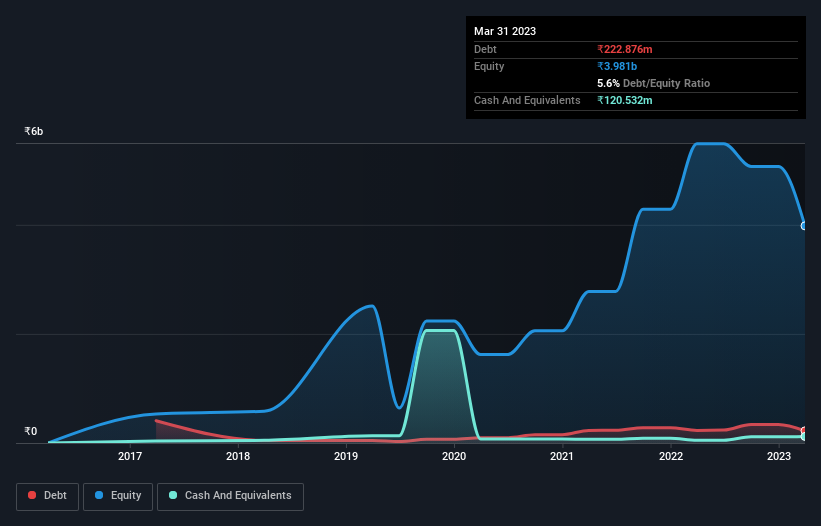Auditors Are Concerned About Palash Securities (NSE:PALASHSECU)
When Palash Securities Limited (NSE:PALASHSECU) reported its results to March 2023 its auditors, Agrawal Subodh & Co could not be sure that it would be able to continue as a going concern in the next year. Thus we can say that, based on the results to that date, the company should raise capital or otherwise raise cash, without much delay. Even more worrying, the auditor has noted that their opinion of the accounts is qualified, which means that the company will probably have trouble with its lenders, as well as potential investors.
If the company does have to issue more shares, potential investors will be sure to consider how desperate it is for capital. So current risks on the balance sheet could have a big impact on how shareholders fare from here. The biggest concern we would have is the company's debt, since its lenders might force the company into administration if it cannot repay them.
View our latest analysis for Palash Securities
How Much Debt Does Palash Securities Carry?
The chart below, which you can click on for greater detail, shows that Palash Securities had ₹222.9m in debt in March 2023; about the same as the year before. On the flip side, it has ₹120.5m in cash leading to net debt of about ₹102.3m.

How Strong Is Palash Securities' Balance Sheet?
The latest balance sheet data shows that Palash Securities had liabilities of ₹353.4m due within a year, and liabilities of ₹7.66m falling due after that. Offsetting these obligations, it had cash of ₹120.5m as well as receivables valued at ₹25.4m due within 12 months. So it has liabilities totalling ₹215.1m more than its cash and near-term receivables, combined.
Palash Securities has a market capitalization of ₹1.04b, so it could very likely raise cash to ameliorate its balance sheet, if the need arose. But it's clear that we should definitely closely examine whether it can manage its debt without dilution. When analysing debt levels, the balance sheet is the obvious place to start. But it is Palash Securities's earnings that will influence how the balance sheet holds up in the future. So when considering debt, it's definitely worth looking at the earnings trend. Click here for an interactive snapshot.
Over 12 months, Palash Securities made a loss at the EBIT level, and saw its revenue drop to ₹535m, which is a fall of 3.7%. That's not what we would hope to see.
Caveat Emptor
Importantly, Palash Securities had an earnings before interest and tax (EBIT) loss over the last year. Its EBIT loss was a whopping ₹120m. Considering that alongside the liabilities mentioned above does not give us much confidence that company should be using so much debt. Quite frankly we think the balance sheet is far from match-fit, although it could be improved with time. However, it doesn't help that it burned through ₹135m of cash over the last year. So suffice it to say we consider the stock very risky. In any event, once you consider that the auditor has qualified their opinion, there is no way we would be interested in buying shares in this company. When analysing debt levels, the balance sheet is the obvious place to start. However, not all investment risk resides within the balance sheet - far from it. For example, we've discovered 4 warning signs for Palash Securities (3 make us uncomfortable!) that you should be aware of before investing here.
When all is said and done, sometimes its easier to focus on companies that don't even need debt. Readers can access a list of growth stocks with zero net debt 100% free, right now.
New: Manage All Your Stock Portfolios in One Place
We've created the ultimate portfolio companion for stock investors, and it's free.
• Connect an unlimited number of Portfolios and see your total in one currency
• Be alerted to new Warning Signs or Risks via email or mobile
• Track the Fair Value of your stocks
Have feedback on this article? Concerned about the content? Get in touch with us directly. Alternatively, email editorial-team (at) simplywallst.com.
This article by Simply Wall St is general in nature. We provide commentary based on historical data and analyst forecasts only using an unbiased methodology and our articles are not intended to be financial advice. It does not constitute a recommendation to buy or sell any stock, and does not take account of your objectives, or your financial situation. We aim to bring you long-term focused analysis driven by fundamental data. Note that our analysis may not factor in the latest price-sensitive company announcements or qualitative material. Simply Wall St has no position in any stocks mentioned.
About NSEI:PALASHSECU
Palash Securities
An investment company, engages in the food processing business in India and internationally.
Low risk with imperfect balance sheet.
Market Insights
Community Narratives



